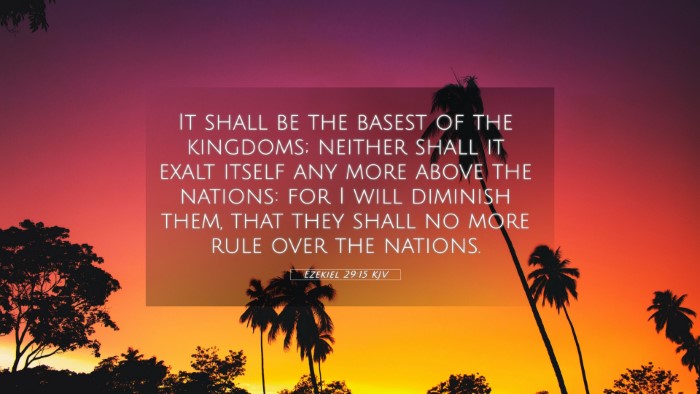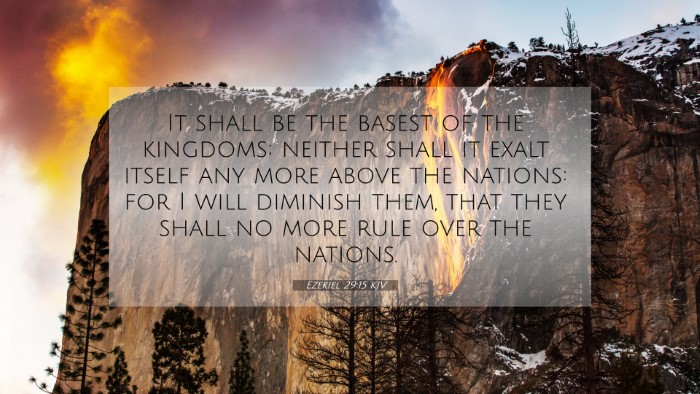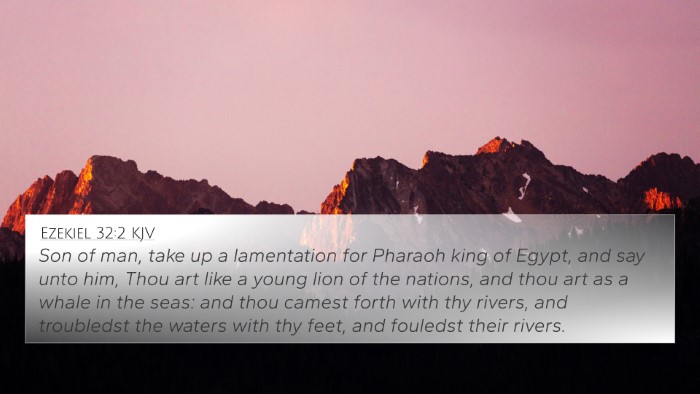Ezekiel 29:15 - Summary and Interpretation
Ezekiel 29:15 states: "It shall be the basest of the kingdoms; neither shall it exalt itself any more above the nations: for I will diminish them, that they shall no more rule over the nations." This verse serves as a significant prophetic declaration concerning the fate of Egypt and its place among the nations.
Meaning and Context
The primary theme in Ezekiel 29:15 revolves around the divine judgment pronounced upon Egypt, emphasizing its decline in status and power. Both Matthew Henry and Albert Barnes provide insights into how this verse addresses the eventual humiliation of Egypt compared to other nations.
Commentary Insights
- Matthew Henry's Commentary: Henry highlights that Egypt, once a formidable empire, will be reduced to the "basest of the kingdoms," suggesting a complete reversal of fortunes due to its pride and opposition to God’s people.
- Albert Barnes: Barnes expounds on the meaning of "the basest of the kingdoms" as indicating the utter loss of power and influence, reinforcing the idea that Egypt would no longer be a dominant force among nations.
- Adam Clarke: Clarke notes that this diminishment is a direct result of God's sovereign will and serves as a warning to all nations to heed His judgment.
Thematic Connections
Ezekiel 29:15 ties into several key biblical themes, including God's sovereignty, judgment, and the consequences of pride among nations.
- God's Sovereignty: The notion that God controls the rise and fall of nations is prevalent throughout Scripture, correlating with passages like Daniel 2:21 and Isaiah 40:17.
- Judgment Against Pride: The downfall of proud nations is a recurring theme seen in Proverbs 16:18 and Obadiah 1:3-4, reminding readers of the perils of hubris.
Cross References
Several other Bible verses that relate to Ezekiel 29:15 include:
- Isaiah 19:1-6: Describes the judgment on Egypt.
- Jeremiah 46:28: God's promises of protection for Israel contrasted with Egypt's fate.
- Ezekiel 30:6: Continuation of the theme of Egypt's downfall.
- Daniel 4:37: A reminder of God's power to humble the proud.
- Isaiah 14:3-4: Addressing the fall of Babylon, which can parallel the fall of Egypt.
- Revelation 18:2: Similar themes of the fall of nations due to divine judgment.
- Amos 9:7: God's judgment extending to other nations, including Egypt.
Comparative Bible Verse Analysis
To further enhance the understanding of Ezekiel 29:15, one can engage in cross-referencing Biblical texts that discuss the nature of God's judgment and the nature of nations in rebellion against Him.
- By comparing: Ezekiel with the contemporary prophets and examining their messages, deeper insights emerge into how God interacts with nations.
- Connections between Bible verses such as Ezekiel's prophecies and the messages of Jeremiah provide a broader understanding of Israel's historical context and the geopolitical landscape of the time.
Tools for Further Study
Utilizing a Bible concordance or Bible cross-reference guide can facilitate deeper study into themes of divine justice and sovereignty.
- How to use Bible cross-references: By identifying connections between Old and New Testament teachings, students can illustrate the continuity of God's message.
- Cross-reference Bible study methods: Engaging in thematic studies can reveal underlying messages in various books of the Bible.
User Intent Insights
For those seeking to explore the implications of Ezekiel 29:15, questions might include:
- What verses are related to Ezekiel 29:15? Studying related passages can uncover God's larger narrative.
- How do Ezekiel 29:15 and Isaiah 19 connect? Both emphasize the theme of Egypt's decline and God's overarching power.
Conclusion
In summary, Ezekiel 29:15 serves as not only a prophetic warning to Egypt but also as a profound reminder to all nations regarding the sovereignty of God and the ultimate futility of opposing Him. Engaging with this verse through the lens of scriptural cross-referencing and comparative analysis enriches our understanding of Biblical prophecy and God’s impartial judgment upon nations.










